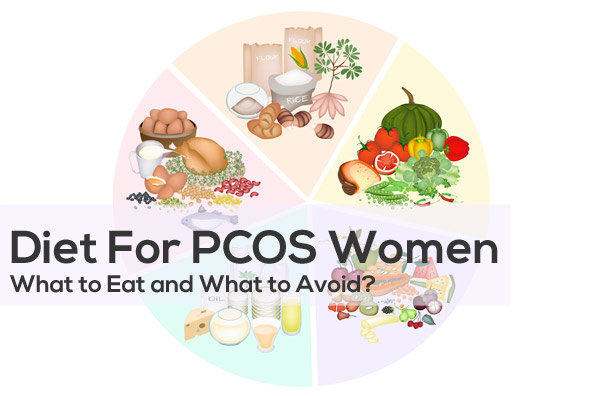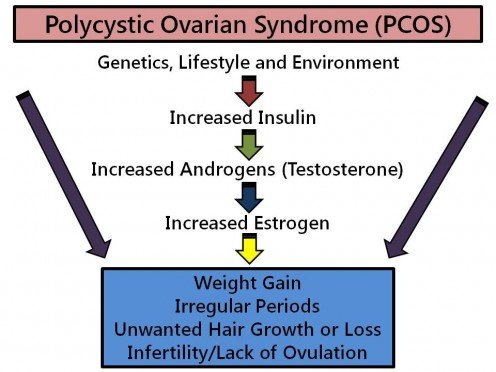
Affecting up to 10% for 15 to 50 year old women, Polycystic Ovary Syndrome (PCOS) is a condition which prevents the ovaries from working effectively. With a pronounced effect on periods, physical appearance, fertility and moods, it can be a dormant condition, which goes undetected for a number of years.
Typically, women affected by PCOS have larger ovaries which are covered externally with cysts. Women without PCOS have follicles covering their ovaries, which are small swellings where the egg develops prior to ovulation. When these follicles stop growing at an early stage and don’t release an egg, they form fluid filled sacks otherwise known as cysts.
Polycystic ovaries tend to have about 12 or more cysts, which will rarely develop entirely, or ovulate to produce a fertile egg. Women with PCOS rarely ovulate, which means they are less fertile and often have irregular periods. Additional side effects include weight gain and unwanted body hair. Many women with PCOS find it impossible to conceive.
With the advances of medicine looking to what we eat as indicators of health and wellbeing, many dieticians and nutritionist have completed research about what foods best to consume on the PCOS diet, and which to avoid.
Contents
Symptoms of PCOS
There are a variety of symptoms sufferers of PCOS may experience, which include but are not limited to:
- Missing or infrequent periods.
- Infertility – because women with PCOS are not ovulating, then many find it difficult to conceive.
- Increased chance of miscarriage – those suffering with PCOS have increased levels of luteinising, a hormone related to ovary function. Raised levels of luteinising increase the chances of miscarriage if women do manage to get pregnant.
- Acne on the face and neck, sometimes shoulders
- Unwanted body hair
- Obesity and related problems
- Thinning hair
Diet and exercise
Important parts of managing PCOS, diet and exercise need to be regulated. Many women believe that they eat a healthy diet, but actually inadvertently incorporate foods that can exacerbate the condition.
This is because being a hormone related condition, women with PCOS often have higher levels of insulin; resulting in difficulty maintaining a healthy weight. Eating a balanced diet of the right foods, taking regular exercise, and losing some weight to achieve a healthy BMI can all help PCOS improve.
Insulin: the PCOS enemy
More famous for its connection with diabetes, insulin is also considered a contributing factor into the onset and sustaining of PCOS. Insulin is a crucial hormone; its job is to transport sugar from the blood into the muscles; transforming glucose into energy. High levels of insulin can wreak havoc on the body, leading to increased facial hair growth, excessive weight gain, high cholesterol, polycystic ovaries and an irregular menstrual cycle. Weight gain is a by-product of the notable hunger and cravings that accompany irregular insulin spikes.

What role do Carbohydrates play?
Directly related to insulin is the role of carbohydrates, and so in order to help manage the blood insulin, refined carbohydrates such as white flour, rice, potatoes and sugar cause a spike in insulin levels and should therefore be avoided. Overall, doctors and dieticians recommend a low GI diet, which is made up of wholegrains and unprocessed foods.
Foods to avoid
In addition to avoiding the common perpetrators of insulin spikes such as sugary and baked good, there are many other foods which need to be avoided to benefit women with PCOS.
Dairy Products
Milk causes an increase in testosterone levels even within females. This is due to it containing a protein which inhibits normal testosterone processing. Since testosterone levels are not being managed, the testosterone levels just keep escalating. Suffers of PCOS already struggle with imbalanced hormones and high dairy quotient can really exacerbate the condition.
Saturated fats
Any ‘bad’ fats are inhibitors of progression away from PCOS. Saturated, hydrogenated and transfats should all be avoided, due to their association with developing high cholesterol, heart disease and diabetes. Saturated fats which are primarily found in red meat and dairy products, cause estrogen levels to soar, which ultimately hinders the absorption of nutrients and causes unwanted weight gain. Trans and hydrogenated fats, found in cooked oil, margarine and myriad processed foods, increase risk of obesity related diseases.
Soy Products
Often this comes as a real surprise to people. Naturally, when trying to avoid dairy, many people turn to soy as a substitute. However soy has recently been cited as an inhibitor of ovulation. In addition, many companies us GM soy these days, which can contain many other hormones; upsetting the balance further. Instead, try nut milks or coconut, which contain the necessary proteins, and often many additional health benefits.
Non-organic meat
Similarly, non-organic meat is often pumped full of various hormones, which can complicate matters for sufferers of PCOS. Lean cuts of white organic meat or sustainably sourced oily fish make sensible meat options.
Tip: if you need to use sugar to sweeten your beverage or food, consider using Xylitol.

Foods to include
However, it’s not all negative! There are several foods that can be included in the diet to help reverse or at least regulate PCOS.
Leafy Green Vegetables
Green, leafy vegetables like kale and spinach contain the maximum nutrients per calorie out of any food. Rich in minerals like iron, calcium, potassium, and magnesium; as well as a variety of vitamins K, C, E, and many of the B vitamins, these make an essential and tasty addition to any PCOS diet.
Vitamin B is highly effective in managing PCOS symptoms, due to its vital role in sugar and fat metabolism; thyroid function and stability; and hormone balance, amongst others. Consuming foods high in B vitamins will help to manage PCOS.
A Rainbow
How can you eat a rainbow? Consume a variety of brightly coloured vegetables, which flaunt their rich source of antioxidants. This includes the whiter vegetables like cauliflower too. PCOS increases the rate of oxidative stress in women, which is physiological stress is placed on the body when dealing with high numbers of free-radicals. Eating foods rich in antioxidants helps our bodies overcome oxidative stress.
Fruit
Packed with fibre, vitamins, minerals and phytonutrients, fruit plays a vital role in enjoying reduced symptoms of PCOS.
Despite its fructose levels being related to spike in insulin, fruit is still a key component in enjoying a balanced diet for POCS. So long as you choose fruits that have a lowered GI and try eating with a handful of nuts or seeds, this can be regulated helping to receive the benefits from the nutrients in fruit.
Lower GI value fruits include: blueberries, prunes, kiwis, cherries, plums, grapefruit, grapes, coconut apples, pears and dried apricots.
Healthy Fats
Rather like us: not all fats are created equal. Above we listed some of the ‘bad’ fats to avoid, but there are a whole group of fats which are essential to a PCOS diet. Essential fatty acids are vital to maintain cell walls. This allows nutrients in, and toxins out of the body’s cells. Additionally they are essential for hormone balance, weight management and optimizing fertility.
Primarily found in nuts and seeds, oily fish, avocadoes and olive oil, these healthy fats should make up a part of your daily diet if you have PCOS.
Coconut Oil
Coconut oil is the wonder supplement of the modern age. Helping to regulate sugar levels and improving insulin secretion, coconut oil can reduce the risk of diabetes, which is closely linked with PCOS. The saturated fat in coconut oil is a rare variety, which doesn’t lead to the accumulation of fat in the heart and arteries.
Anyone suffering with PCOS should seek advice from doctors as well as using nutrition to help overcome symptoms, and should consider exercise as part of management of the condition.